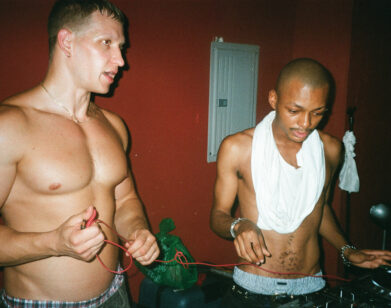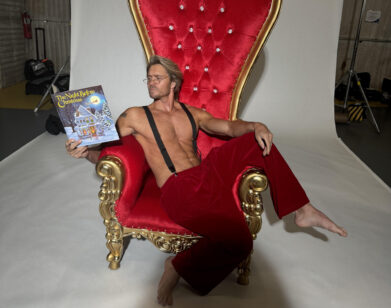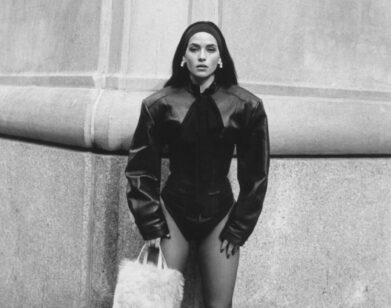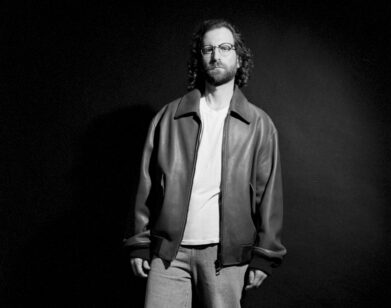Two Minute Oscars
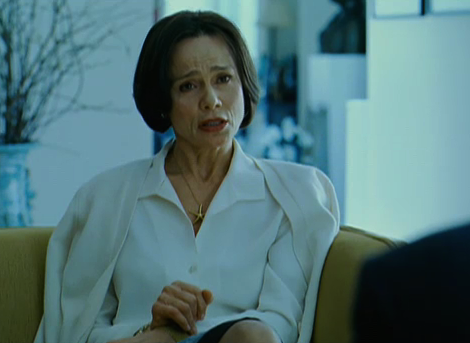
Interview began awarding our own Oscars for greatness in extremely small packages in 1981, because if we didn’t, who would? And although Steve Buscemi, Delroy Lindo and Brooke Smith were among that first crop of “unknowns,” the idea wasn’t to scout Stars of Tomorrow. It was to celebrate actors who deliver a fully rounded character with the fewest strokes, to recognize the uphill years behind such indelible bursts of energy—and to give a shout-out to tenacity and to keeping on keeping on (hullo there, Margo Martindale! howdy Gene Jones!).
Since 1981, we have had years when directors and, more crucially, writers (although not the Coen brothers, and certainly not Mike Leigh), did away with deftly written small parts in favor of The Girl, The Guy and Her Girlfriend. Not today: filmmakers have suddenly rediscovered the ensemble and the power of filigree, and in 2008, ten of the niftiest of these were:
1. Katrina Fernandez as the fiery Flamenco teacher from Seville in Happy-Go-Lucky, who attempts to ignite gypsy passion in an after-work class of 40-ish, amiable, willing English puddings. With her back arched, her red heels drumming dangerously, her syntax a wonder of its own, she’s a figure of implacable dignity, until thoughts of her private life blindside her and she’s wracked with the pent-up fury of a woman betrayed. Her shift from devastating comedy to sheer devastation is jaw-dropping. Hola Fernandez, a thoroughly English actress, who learned Flamenco at the same time she evolved her singular accent and her ferocious assault on all things British.
2. Jennifer Coolidge in Soul Men as Rosalee, a San Antonio gal who gives Bernie Mac the surprise of his life when he picks her up and brings her back to his hotel room. Coolidge, ever fearless, ever joyous, throws Mac down on the bed, shimmies her blissfully prodigious bosom in his face and then offers him a glimpse of private paradise—a sight that prompts the late, great Mac to utter a line too raunchy to repeat and too funny to miss.
3. Bob L. Harris uses the law, not a six-shooter, to cut a murderous cattle baron (Jeremy Irons) down to size in Appaloosa. As a traveling circuit court judge, Harris, with his white hair, beard, and barely concealed impatience for two-faced power brokers, appears to be channeling the late Robert Altman. If it strikes you that Harris has scored Appaloosa‘s funniest line—a bit of business about “bees in the honey”—credit the film’s director and star, Ed Harris, who is smart enough to give his daddy the last word.
4. Deborah Harry doesn’t appear until the final moments of Elegy, but we’ve had plenty of time to wonder about her, especially as marriage seems to have brought only crumbs from her husband Dennis Hopper. He’s a Pulitzer-prize poet, who, when he’s not writing, is busy as the “earthly confessor” of his best friend and celebrated academic (Ben Kingsley), regarding his complicated love life (Penelope Cruz.) Elegy‘s subtext is the imminence of death, but when it comes suddenly, Harry’s wry, mature delivery of the moment’s pivotal line reveals how deep her character’s knowledge has been—and how canny director Isabel Coixet was to choose an actress with her own depths to draw on.
5. Greta Scacchi, Italian born herself, brings warmth and worldliness to the role of Cara, the Italian mistress of the aging Englishman, Lord Marchmain (Michael Gambon), who long ago fled the stately manor that haunts Brideshead Revisited. A woman who sees all, Cara uses a beachside picnic to advise the social-climbing Charles Ryder (Matthew Goode) to “tread lightly” with the heart of Marchmain’s son Sebastian (Ben Whishaw), whose intense affection for Charles is, Cara suspects, more than “just a phase.” As Charles runs off to romp in the surf with Sebastian and his sister, Scacchi shifts, in the blink of an eye, from a look of optimism to one haunted by knowledge of how such stories tend to play out.
6. Stacey Keach as the Reverend Earle in W, gives a born-again, yet still uncertain George W. Bush a lesson in the glories of political power and godliness which, Keach unwinkingly manages to suggest, are two sides of the same coin (in Texas, at least). It might just be this unwieldy film’s best-written scene, not least for the Reverend’s irony-free warning to the newly sober future president that, “The Christian life is not a constant high.”
7. Andre Blake in Rachel Getting Married seems almost lit from within as he does the hair of Kym (Anne Hathaway) his former rehab-mate, the day before her sister’s wedding. Facing his methadone muse, as though reciting the Lives of the Saints, he reminds Kym of each of the acts of courage she’d confided to her not-very-secret diary: pulling her sister Rachel through bulimia, overcoming assault by a beloved uncle. It was her strength, he swears, that led him to utterly change his life. Unfortunately, getting swept up in “their” story makes him oblivious to Kym’s dawning horror; she’d made up every lurid detail, and the “bulimic” bride-to-be is just two chairs away. In the family fracas that follows, only the stylist remains unscathed, still deluded, still blissfully innocent.
8. Stanley Townsend’s nightmarish Tramp in Happy-Go-Lucky marks the only time we’ve used two actors from the same movie, yet we couldn’t omit the depths of Townsend’s compassionate, detailed portrait of this universally tragic figure. Clearly living in at least three worlds at once, the Tramp exists to test Poppy’s conviction, not that all people are good, but that they all deserve to be listened to. There are moments when she and we are equally afraid that this hulking, bearish man, driven mad by we don’t know what, will swipe at her with one huge hand and leave her crumpled among these ruined buildings. Or worse. Yet, when he presses a question to her in his made-up gibberish, and she agrees with him, quietly, eye-to-eye, he subsides. He wants only connection, and after he shambles off, Poppy totters away, aware of how narrowly her ideals have beaten the odds, this time.
9. Elias Koteas has a delicate, sorrowful dignity as Mr. Cake, the blind Clockmaker who starts everything (backward) in The Curious Case of Benjamin Button. Mr. Cake keeps to his work of building a huge clock for installation at a vast New Orleans train station even while his son goes off to World War I. Clambering around its works, adjusting only by touch, Mr. Cake makes a fateful adjustment when that only son is killed, a moment Koteas hits like a plangent grace note. At the ceremonial unveiling, Cake’s whole being seems steeped in mourning as he reveals the secret to his clock’s backwardness: “So that perhaps the boys lost in the war might come home again” through his recaptured hours. In Koteas’ hands the film’s semi-magical beauty and gentle rumination are perfectly sustained, even to his fairytale exit, rowing out on a cerulean sea.
10. Lena Olin is The Reader‘s steely unforgiving voice, she speaks for those who were in “the camps,” Auschwitz et al. At the film’s coda, Ralph Fiennes seeks out this survivor in New York, to present her with a death bequest from a former guard on the Woman’s block that housed her and her mother. Now obviously living well, Olin is ramrod stiff and withering: she will not participate even marginally in such expiation, not for Fiennes, never for a Nazi. “Go to the theatre, if you want catharsis,” she suggests. She unbends just one millimeter at the sight of the guard’s battered little tin box; that she will keep, that everyday link to her past—and her mother’s. In a film whose messages about guilt are, to put it politely, murky, Olin’s centering clarity comes like a clearing of the skies.


